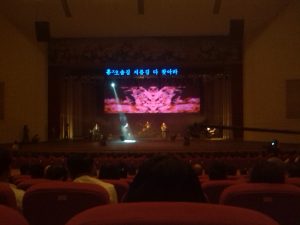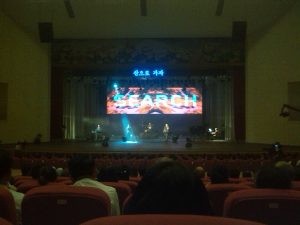In 2015, a whisper of something extraordinary happening in the DPRK began circulating around those of us who watch the country with interest. A foreign band was to play in Pyongyang, but we weren’t sure who, or when.
Things like this aren’t entirely unheard of. In 1999, Bill Clinton’s brother visited the DPRK and gave a performance with Koreans from north and south of the DMZ. In 2012, Norwegian director Morten Traavik organized the first ever Norwegian cultural festival in Pyongyang, on the national day of Norway. So whilst there is precedent for cultural exchanges of this type involving North Korea, it’s rare enough that anything new is met with extreme hype. What would be normal for any other country in the world, when viewed through the lens of the DPRK, it’s rightly or wrongly seen as surreal and bizarre.
We knew who the band would be, and when they would play, a few months before the press did. I can’t say that I had heard of Laibach before I found out that they would visit the DPRK. Avant-garde industrial rock isn’t my top genre – I’m more into hipsters with acoustic guitars – but I watched all of their music videos with intense interest and found myself very surprised that this would be the band chosen to perform what would be the first rock and roll concert in North Korea’s history.
Take a look at their most recent music video, Whistleblowers. Those who have visited the DPRK will instantly recognise the similarities in some of the imagery in the video, and what you can on the streets and in the buildings of North Korea.
“We knew that this would be big, but I don’t think anyone was expecting it to blow up to the extent that it did. The BBC, CNN, Reuters, pretty much every major world news outlet picked the story up and comedian John Oliver ran a segment on his talk show. The question “which foreign band will play in North Korea” was even asked at one of the pub quizzes that I frequent. (One of the questions that I actually knew the answer to!)”
It was a strange feeling, watching the world speculate as to whether the concert would go ahead and what would happen when the band arrived in the DPRK. In collaboration with Morten Traavik, the concert organiser, we began filling up places on our Laibach in Pyongyang tour. It was to be a regular, three-day tour to Pyongyang and the DMZ with the added extra of watching history in the making.
So myself and my twenty European rockers arrived in Pyongyang and thanks to the hard work of Morten and my colleagues, we found ourselves on the bus on the way to the concert. As we pulled into the venue, I realised that I’d never seen this place before despite my several trips to Pyongyang. I was informed that this was Ponghwa Art Theatre, capacity 1500, and it was located inside the Ministry of Public Security. Definitely not a regular stop on group tours, and I can’t say that I know any tourists who have been there before.
tours, and I can’t say that I know any tourists who have been there before.
“Upon arrival, our group was checked against a guest list and each name was verified to ensure that we were supposed to be there. We were ushered through marble halls into the venue. Every seat except those reserved for us was full. Except for our twenty people, six from another tour company and perhaps forty foreigners who had the look of diplomats and businessmen, every other person in the hall was DPR Korean.”
It was an indescribable feeling, being somewhere that tourists don’t get to go, knowing that we were about to see something that was a first of its kind. Thinking that whilst we were sat in our seats, the outside world was abuzz with what was happening in this very hall.
The lights dimmed and the performance began. Laibach started with Whistleblowers, complete with music video in the background. It was hard to tell, but the video was slightly censored – for example, the portrait of the main singer was edited to make it smaller than the version you can see on Youtube. The lyrics of the song, however, remained the same.
“From north and south,
we come from east and west.
Breathing as one,
living in fame or dying in flame.
We stand alone,
but soon the day will come ,
When freedom reach,
we meet again and we take the lead.”
“The translated lyrics in Korean above the bands head, I’m assured by a fluent English/Korean speaker who was present, were entirely accurate.”
The band then went on to cover songs from the Sound of Music. It may seem like an odd choice, especially considering the unique vocal sound of the lead singer, but the Sound of Music is very well known in the DPRK and our Korean business partner sat next to me was humming along to the music. They went on to sing The Final Countdown and the traditional Korean song Arirang, before finishing again with Whistleblowers. The whole set lasted maybe 45 minutes. I later learnt that approximately half of the scheduled songs were cut from the setlist on short notice.
It was an odd juxtaposition. Laibach performed in a style that any of us who have attended gigs would be familiar with. Strobe lights, loud music, flickering images in the background serving as an abstract accompaniment to the songs. But to the Koreans in the audience, this was something that they had never seen before and this was reflected in the faces of the audience as I watched them take in the show.
“Bemused is how it has been described by others who were there, and that’s the first word that came to my mind as well. They didn’t seem sure how to react. That’s not surprising considering the nature of what was happening, and also that the venue was a seated music hall, not the empty space that many of us would be used to dancing around in if we had attended this gig in our home countries. It added to the slightly surreal feel of the evening. The audience and the venue were distinctly North Korean. What was happening up on stage was definitively not.”
As the band performed Whistleblowers for the final time, the lights came up and the audience began to filter out. Our Korean business partner described what he had just seen “strange but lovely” and I have to agree with him.
After the concert, myself and six others from my group who personally knew the band were invited to the after-concert dinner at the famous Taedonggang Diplomats Club. Ourselves, the band themselves, and the concert organisers were there and we ate and drank as thanks were given and many toasts were had. The overwhelming feeling in the banquet hall was one of relief. That it had happened, and that it had been done well.
The rest of the tour passed just like a “normal” Pyongyang tour. Every so often, one of my tourists would stop what they were doing to give out high fives that we had been among the few foreigners to have actually been there, and actually seen it.
We were there, and we did see it. It feels a little like a dream now I’m back in Beijing, and I can only hope that the success of the project opens doors to more cultural exchanges of this type. I think both sides can stand to benefit greatly. As one Korean man put it when speaking to the band, “I didn’t know that such music existed in the World and now I know.”






